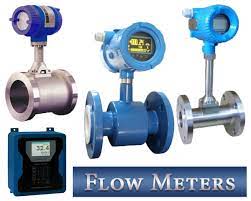The flow meter is the most powerful part of a fluid handling system. Meter is important and necessary to monitor the efficiency of your work. It is important to choose the right and suitable meter as if you don’t do so, you will not have the right accuracy and efficiency of your work done. So don’t worry, choosing the right flow meter is not very difficult. And in this article, we will try to elaborate it in simple words and terms and types of flow meters .
What is a Flow Meter?
It’s a device that measures the flow of any material; it can be liquids or gasses. It typically calculates the flow rate and the volume of any product through a pipe. It sounds simple, but it is way more complicated in real-life applications or practices.
Points to keep in mind while selecting the proper flow meter.
Here are some important points that you must keep in mind when you purchase a flow meter
- System configuration
- Flow range or turndown
- Cost
- Hygiene requirement
- Repeatability and accuracy
- Material of construction
- Type of fluid
- Pressure
- Temperature
- Toxicity
- Density
- Conductivity
For an ordinary person, every flow meter may seem the same. But the application and working are very different for every flow meter.
Now let’s compare some of the renowned meters and see the advantages and disadvantages of each.
Comparison
Let’s take a deep insight into each type of flow meter. Every flow is suitable for some purposes and is not suitable for others. The best quality of flow meter depends upon the purpose for which it is purchased.
Positive Displacement Flow Meters
Advantages
- It needs no power supply
- It gives an accurate measurement
- Cost-efficient
Disadvantages
- It experiences great pressure drops
- It usually requires medium to light flow application
- Many components also need needs regular maintenance and replacements
Electromagnetic Flow Meters
Advantages
- Cost-efficient
- They are very highly accurate
- They experience zero pressure drops
- They don’t have any moving component
Disadvantages
- They are unable to measure non-conductive liquid, gases, or any vapors
- They have a limited range of fluid temperature
Turbine flow meters
Advantages
- It is also cost-efficient
- It is also highly accurate
- It can also read low flow rates
Disadvantages
- It has limited and certain pipe sizes
- Don’t use them or spoiled or suspended liquids.
- It is not capable of measuring high flow rates with accuracy.
Coriolis Flow Meters
Advantages
- It doesn’t need any maintenance
- It is very highly accurate
- It doesn’t need any straight pipe run
- It can also measure gasses easily
Disadvantages
- It can only offer some limited pipe sizes
- It is not suited for any low-pressure gasses.
Conclusion
There are a variety of flow meters, and every meter is good in its field. We covered some most common meters, but there is still a lot more to know. If you are not pretty sure which one will suit you the best, read this article once more, see the advantages and disadvantages, and see what suits you the most. Once you have a clear idea, go for the same for your work needs. Further, you may ask for the assistance of experts, as they will help you find the best flow meters as per your needs.

